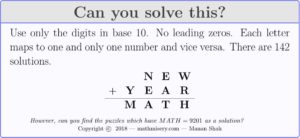Alright, the holidays are coming to an end and the second half of the school year is about to begin. Let’s work off some of the rust! Here are a few puzzles to give to your students as warm-ups or challenges depending on where they are.
Puzzle #1
Find all quadratics such that solutions to \((ax + b)(cx + d) = 0\) are integer with \(a,b,c,d\) all unique and chosen only from \(\{2,0,1,9\}\)
Some gotchas and things to note:
- \((0x + 2)(1x + 9)\) isn’t a quadratic! Or at the least, you can have a nice debate about this.
- I leave it to you to decide if you will accept \((2x + 9)(1x + 0)\) as a quadratic that satisfies the question above (one of the roots is integer, but the second isn’t).
- Your students be warned: \((2x + 0)(1x + 9)\) is the same as \((1x + 9)(2x + 0)\)!
Puzzle #2
How many distinct quadratics can be made of the form \((ax + b)(cx + d)\) where \(a,b,c,d\) are all unique and chosen only from \(\{2,0,1,9\}\)?
The answer isn’t \(4! = 24\) nor is the answer \(\binom{4}{2} = 12\).
Puzzle #3
This one depends on Puzzle #2.
If \(a,b,c,d\) were chosen uniformly randomly without replacement from \(\{2,0,1,9\}\) what is the probability that \((ax + b)(cx + d)\) is a quadratic? What if \(a,b,c,d\) were chosen uniformly randomly with replacement?
Puzzle #4
Without using a calculator determine which is larger, \(201^{9}\) or \(20^{19}\).
Puzzle #5
Without using a calculator determine which is larger, \(2^{910}\) or \(9^{210}\).
Puzzle #6
Only using the digits \(2,0,1,9\) exactly once and assigning them to \(a,b,c,d\) what’s the largest number that can be formed when written as \(a^{bcd}\) or \(ab^{cd}\) or \(abc^{d}\)?
Some points of clarification if there is a sense of ambiguity:
- You can only construct numbers of the three forms given above. The task is to find the construction that will yield the largest value.
- When I write “\(abc\)” I mean digit concatentation, not multiplication. So, if \(a = 2, b = 0, c = 9\) then \(abc = 209\)
Puzzle #7
Got fraction troubles? Try this
Choose \(a,b,c,d\) uniquely from \(\{2,0,1,9\}\). Which subtraction(s) of the form \(\displaystyle \Big|\frac{a}{b} – \frac{c}{d}\Big|\) is (are) closest to ONE?
Puzzle #8
How many four-digit prime numbers can be created using \(\{2,0,1,9\}\) exactly once? And what are they, if there are any? No calculator allowed!
Puzzle #9
Try this alphanumeric puzzle for the new year!

Puzzle #10
Construct two lines, one with positive slope and one with negative slope, such that their intersection is at the point \((20,19)\).
please send soluton
Puzzle 1# Quadratics Equations are (1x+2) (9x+0), (1x+9) (2x+0)
nicely done! Those certainly work.